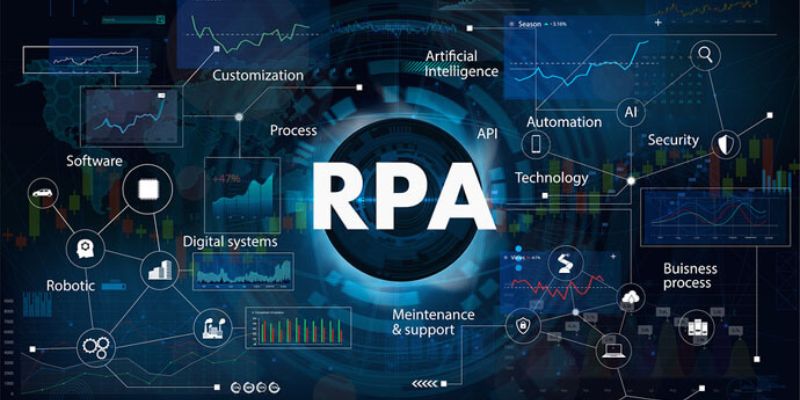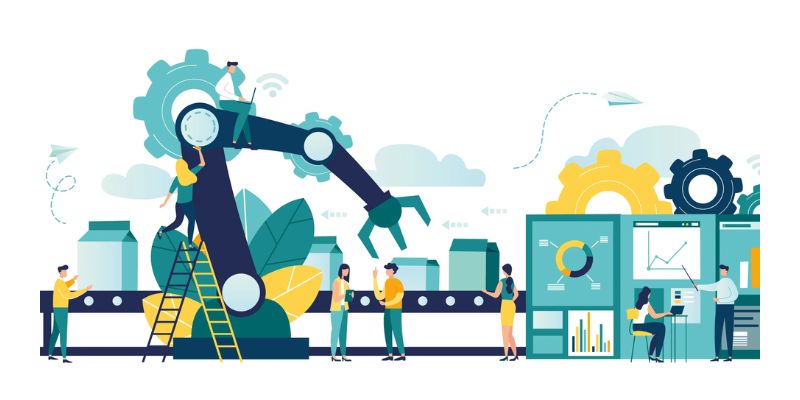Robotic Process Automation (RPA) is no passing trend. As various sectors strive for greater efficiency and better service, they place RPA at the front line of their tech evolution. Here, I’ll unveil the top industries adopting RPA solutions, showing you the remarkable ways they’re reshaping their landscapes. From handling transactions in banking to managing patient data in healthcare, the push for automation is not just about cutting costs. It’s a strategic move for quality, speed, and innovation. Whether it’s the automated checkouts in retail or the precision in manufacturing logistics, RPA stands as a game-changer. Read on to discover which fields are leading the charge and how they’re doing it.
Banking and Financial Services: Early Adopters of RPA
Enhancing Customer Service with RPA
Banks were among the first to say, “Yes” to RPA, or Robotic Process Automation. They saw it could make happy customers and cut costs. These smart banks used RPA to speed up how they handle money and talk to folks. Now, imagine asking about your account and getting an answer in a snap. That’s RPA at work! It’s like having a super-fast helper, ready 24/7, making no mistakes. And it’s not just talk; banks have made wait times shorter and service better, all thanks to RPA.
Streamlining Compliance and Reporting
Now, let’s look at rules banks must follow. There’s a lot, right? RPA makes this easier too. Before RPA, checking all the boxes took time and lots of work. But now, these bots help banks stay on track with laws without a sweat. They check things, file reports, and keep everything neat. So, when someone asks if a bank’s following the rules, RPA helps make sure the answer is a big “Yes”. Plus, because RPA does routine stuff, people at banks have more time for other important work. It’s a game-changer, making sure banks play by the book without wasting time or money.

Healthcare Sector: Prioritizing Efficiency with RPA
Automating Patient Records and Data Management
Healthcare is changing fast, thanks to RPA. Say goodbye to piles of paper and files. Now, managing patient records is simple. RPA puts all the info doctors and nurses need in one easy place. No more waiting or mistakes. Quick and correct—that’s how healthcare works best with RPA.
Keeping records safe and private is key in healthcare. RPA makes sure all the patient info stays secure. Lost files? Not anymore. With RPA, every detail is where it should be. This makes caring for patients faster and safer, which is what every doctor wants.
RPA in Clinical and Administrative Operations
Imagine this: a hospital where everything runs on time. That’s what RPA does. From setting up appointments to getting lab results, nothing falls through the cracks. Everyone in the clinic can focus more on helping patients, not on boring paperwork.
RPA doesn’t just help with patient care. It also takes care of the bills. When it’s easy to handle payments and insurance, everyone’s happy. Hospitals can serve patients better with less worry about costs.
But remember, while RPA is awesome, it can’t do everything. Nurses and doctors are still the heroes who care for us. RPA is like their trusty sidekick, making the tough jobs a little easier day by day.

Manufacturing and Retail: Boosting Productivity Through Automation
Integrating RPA in Supply Chain and Logistics
In manufacturing, time and accuracy are gold. Robots handle tasks like tracking items. They do it fast and without mistakes. This means products move quicker and without mix-ups. Robotic Process Automation in Retail helps too. It keeps shelves stocked and prices right.
These robots aren’t sci-fi; they’re software on computers. In supply chains, they make sure orders fill up and ship out right. They save workers from dull, repetitive work. This lets people focus on things robots can’t do. We call this RPA Impact on Supply Chain. It’s big. It saves money and makes customers happy.
Imagine a software robot tracking a package from factory to truck to store. It ensures the package is never lost. And if it is, RPA spots the error right away. This quick fix saves time and stress. RPA in Logistics and Freight is all about smooth delivery of products to places they need to be.
Advancing Retail Operations with RPA Solutions
Now, think of a busy store. People buy things and need help. RPA takes care of easy questions like “How much does this cost?”. This leaves more time for workers to help with special requests. That’s how RPA Solutions for IT Industry changes the game in retail.
These smart systems also predict what shoppers want. It’s like reading minds, but it’s just good data use. If a store runs low on popular toys, RPA signals for more. This is Benefits of RPA in E-commerce. The right stock is always ready. And who doesn’t love finding just what they want?
In retail, there’s a lot of price changes. It can drive people nuts. RPA keeps up with the madness. It updates price tags, deals, and offers, all without a sweat. That’s Robotic Process Automation in Retail making life easier. It’s about doing more with less stress.
Bots also handle returns, always a headache. They process them quickly, keeping records straight. Happy customers mean more business. That’s a win for everyone.
So, RPA in these areas is much more than just a cool tech story. It’s real help. It means less time on boring tasks and more time for building business. RPA turns long to-do lists into all-done lists. And that’s a story everyone in manufacturing and retail loves to hear.

Insurance and Telecommunications: Transforming Processes with RPA
RPA in Claims Processing and Customer Relations
Robotic Process Automation is a game-changer in insurance. It speeds up claim processing. No more long waits! It checks claims fast, with zero mistakes. Happy customers? You bet! Folks get their money quick and stress less. It’s not magic, it’s smart tech at work!
But there’s more. RPA helps with talking to customers. Bots can answer simple questions, anytime. They never sleep, unlike us humans! So, while you’re dreaming, they’re helping. Insurance just got more helpful, thanks to these trusty bots.
They help save money, too. With bots, companies need fewer people for boring tasks. They can have their best minds do the important work. This is smart thinking, folks!
So is your insurance claim stuck? Hang tight! Bots might be saving your day, right this second. The future is here, and it’s packed with helpful robots.
Streamlining Operations in Telecommunications
Now onto telecommunications. It’s all about quick, smooth service. No one likes waiting on the phone, right? RPA to the rescue!
Bots can handle mountains of data in no time. We’re talking about all those calls and texts you send. Bots sort them out. This means better service for you. No dropped calls and faster internet. It’s like giving the telecom industry superpowers.
And it’s not just for the big shots! Even small businesses can use RPA. They can give you personal service, just like the old days.
Think better deals and cooler services. That’s what RPA does for telecom.
In both insurance and telecom, these robots are more than tools. They’re helping us live better, one automated task at a time. It’s smart business with a heart. How cool is that?
In this post, we looked at how different sectors use RPA, or robotic process automation, to get better. Banks use it to make their customer service top-notch and to keep reports and compliance smooth. In healthcare, RPA saves time by handling patient info and making both clinical and office tasks easier. For manufacturing and retail, it’s all about making supply chains sharp and improving how stores work. Lastly, in insurance and telecom businesses, RPA speeds up claims and makes customer service shine while keeping things running without a hitch.
So, what’s my final take? RPA isn’t just another tech buzzword; it’s a real game-changer in our working world. It’s making jobs quicker, more accurate, and less of a headache across the board. Trust me, no matter the industry, RPA’s smart moves are worth watching. Let’s stay tuned to see where this tech takes us next!
Q&A :
Which industries are the leading adopters of RPA solutions?
Robotic Process Automation (RPA) is being rapidly adopted by several industries aiming to enhance efficiency, reduce costs, and streamline operations. The leading sectors embracing RPA include:
- Banking and Financial Services – Banks and financial institutions are leveraging RPA for automating repetitive tasks such as data entry, compliance reporting, and fraud detection.
- Healthcare – Hospitals and healthcare providers are using RPA for patient data management, appointment scheduling, and handling insurance claims.
- Manufacturing – Manufacturers are implementing RPA to manage supply chains, inventory control, and back-office operations.
- Retail – Retailers incorporate RPA to personalize customer experiences, manage inventory, and optimize supply chain logistics.
- Information Technology – IT departments are applying RPA to automate service desk operations and network management.
What are the benefits of RPA in industry automation?
The benefits of RPA in industry automation are extensive and include:
- Increased productivity: RPA handles repetitive tasks more quickly than humans, freeing up employees for higher-value work.
- Enhanced accuracy: RPA reduces the likelihood of human error, ensuring more accurate outcomes in processes.
- Scalability: RPA solutions can be easily scaled up or down to meet the changing demands of the business.
- Cost Reduction: By automating tasks, companies can save on labor costs and reduce expenses related to manual errors and rework.
- Improved Compliance: RPA can adhere strictly to regulatory requirements, reducing the risk of compliance issues.
How is RPA different from traditional automation in industries?
RPA differs from traditional automation in several key ways:
- Flexibility: RPA is more adaptable and can be updated quickly to respond to changes in business processes, unlike traditional automation which may require extensive reprogramming.
- Non-invasive: RPA tools can work with existing IT infrastructure without the need for extensive integration or disruption to current systems.
- User-friendliness: RPA platforms typically have user-friendly interfaces, allowing non-technical staff to create and manage bots with minimal training.
- Cognitive Capabilities: Advanced RPA systems can incorporate artificial intelligence and machine learning, giving them the ability to handle unstructured data and make decisions based on past inputs.
What factors should industries consider when implementing RPA solutions?
Industries should consider several critical factors when implementing RPA solutions:
- Process Selection: Identifying which processes are routine, rule-based, and high volume to ensure suitable candidates for RPA.
- Governance Structure: Establishing a clear governance model to manage the RPA lifecycle, from development and deployment to maintenance and scaling.
- Change Management: Preparing the workforce for change by offering training and highlighting the benefits of RPA to ensure employee buy-in.
- Vendor Selection: Choosing the right RPA vendor that aligns with the industry’s needs in terms of scalability, security, and support.
- Monitoring and Analysis: Continual monitoring of RPA performance and analyzing the impact on business outcomes to optimize the use of RPA solutions.
Can small to mid-sized businesses benefit from RPA, or is it only for large industries?
Small to mid-sized businesses (SMBs) can also significantly benefit from RPA, and it is not limited to large industries. RPA can offer SMBs:
- The ability to compete with larger enterprises by increasing efficiency and reducing operational costs.
- Enhanced agility, allowing them to adapt quickly to market changes and customer demands.
- Opportunities to refocus their workforce on growth and customer-centric tasks instead of time-consuming administrative work.
- A scalable solution that grows with their business needs without the requirement for major IT infrastructure investments.



